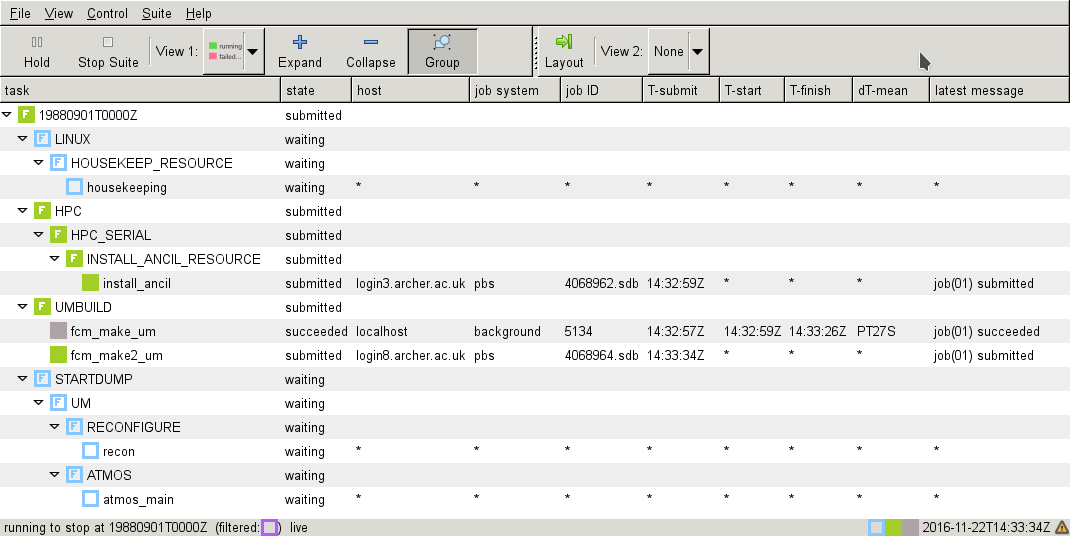UKCA Chemistry and Aerosol vn10.4 Tutorial 1: Difference between revisions
No edit summary |
|||
| Line 26: | Line 26: | ||
The output directory structure of rose suites are rather complex: |
The output directory structure of rose suites are rather complex: |
||
* You can find the latest & full ''job.out'' files in |
* You can find the latest & full ''job.out'' files in |
||
: <code>/work/n02/n02/'''$USER'''/cylc-run/'''[SUITE-ID]'''/log/job/'''YYYYMMDD'''T'''tttt'''Z/'''[JOB NAME]'''/NN</code> |
|||
:: e.g. /work/n02/n02/luke/cylc-run/u-ag308/log/job/19880901T0000Z/fcm_make2_um/NN |
|||
: This file contains what the UM writes out using the <code>umPrint</code> subroutine (what used to be written out using <code>WRITE(6)</code> statements). |
|||
* Output from the individual processors (which are updated as the job is running can be found in |
|||
| ⚫ | |||
:: e.g. /work/n02/n02/luke/cylc-run/u-ag308/work/19880901T0000Z/recon/pe_output |
|||
: A handy command to check the progress of the job is |
|||
| ⚫ | |||
* Output files in 64-bit fieldsfile format can be found (on ARCHER) in |
|||
| ⚫ | |||
: <code>/work/n02/n02/'''$USER'''/cylc-run/'''[SUITE-ID]'''/share/data/History_Data</code> |
|||
: Files often have the following naming convention |
|||
| ⚫ | |||
| ⚫ | |||
::: e.g. <code>ag308a.pk19880901</code> |
|||
Fieldsfile (i.e. 64-bit output) in /work/n02/n02/'''$USER'''/cylc-run/'''[SUITE-ID]'''/share/data/History_Data |
|||
| ⚫ | |||
Whilst this suite is running, take a look at [[UKCA Chemistry and Aerosol vn10.4 Tutorial 2|Tutorial 2: Exploring Rose]]. |
Whilst this suite is running, take a look at [[UKCA Chemistry and Aerosol vn10.4 Tutorial 2|Tutorial 2: Exploring Rose]]. |
||
Revision as of 13:59, 14 December 2016
UKCA Chemistry and Aerosol Tutorials at vn10.4
Copying and Running an Existing Rose Suite
You will need to login to PUMA, e.g.
ssh -Y username@puma.nerc.ac.uk
You should then be asked for the SRS password.
Then launch the UM graphical user interface by:
rosie go
This should then load up a blank interface. Go to Edit Data source and select u. The go to the search panel and type u-ai071 and press return.
Right-click on this suite and click copy suite. A new box will open asking for the project - it is fine to press Forward here. On the next panel, it's fine to just press OK again as well.
The suite will now copy and checkout to your /home/$USER/roses directory, and will also appear when running rosie go.
You should now right-click edit (or double-click) on this new suite, and click run, which is symbolised by a play symbol (i.e., a large grey arrow-head pointing to the right).
This will now compile and run the suite. Pre-builds are being used, so it should take about X to run compile the code, followed by about 90s to run the reconfiguration step, and then 7 minutes to run the UM itself.
The output directory structure of rose suites are rather complex:
- You can find the latest & full job.out files in
/work/n02/n02/$USER/cylc-run/[SUITE-ID]/log/job/YYYYMMDDTttttZ/[JOB NAME]/NN- e.g. /work/n02/n02/luke/cylc-run/u-ag308/log/job/19880901T0000Z/fcm_make2_um/NN
- This file contains what the UM writes out using the
umPrintsubroutine (what used to be written out usingWRITE(6)statements).
- Output from the individual processors (which are updated as the job is running can be found in
/work/n02/n02/$USER/cylc-run/[SUITE-ID]/work/YYYYMMDDTttttZ/[JOB NAME]/pe_output- e.g. /work/n02/n02/luke/cylc-run/u-ag308/work/19880901T0000Z/recon/pe_output
- A handy command to check the progress of the job is
tail -1000f [SHORT SUITE-ID].fort6.pe00 | grep Atm_Step
- Output files in 64-bit fieldsfile format can be found (on ARCHER) in
/work/n02/n02/$USER/cylc-run/[SUITE-ID]/share/data/History_Data- Files often have the following naming convention
[SHORT SUITE-ID]a.p[abcdefghijkmsyx]YYYYMMDD- e.g.
ag308a.pk19880901
- e.g.
Whilst this suite is running, take a look at Tutorial 2: Exploring Rose.
Written by Luke Abraham 2016

